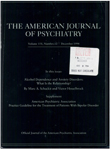Randomized, double-blind, crossover, placebo-controlled comparison of propranolol and betaxolol in the treatment of neuroleptic-induced akathisia
Abstract
OBJECTIVE: Beta-blocking agents, particularly propranolol, are considered effective in the treatment of neuroleptic-induced akathisia, but considerable controversy exists about the involved receptor subtype(s). The authors conducted a randomized, controlled trial comparing the effects of propranolol and betaxolol to determine whether central beta 1-adrenoceptor blockade is sufficient to correct neuroleptic-induced akathisia. METHOD: The subjects were 19 patients whose neuroleptic-induced akathisia responded to 20 mg/day of propranolol and subsequently reemerged during a placebo washout period. They were randomly assigned to propranolol (20 or 40 mg/day) or betaxolol (10 or 20 mg/day) and, after another placebo period, were switched to the second beta blocker. RESULTS: There was no significant difference in the antiakathisia effects of propranolol and betaxolol. CONCLUSIONS: The lack of difference between propranolol and betaxolol suggests that beta 1-adrenoceptor blockade is sufficient to improve neuroleptic-induced akathisia. The results of this explanatory study need therapeutic confirmation.
Access content
To read the fulltext, please use one of the options below to sign in or purchase access.- Personal login
- Institutional Login
- Sign in via OpenAthens
- Register for access
-
Please login/register if you wish to pair your device and check access availability.
Not a subscriber?
PsychiatryOnline subscription options offer access to the DSM-5 library, books, journals, CME, and patient resources. This all-in-one virtual library provides psychiatrists and mental health professionals with key resources for diagnosis, treatment, research, and professional development.
Need more help? PsychiatryOnline Customer Service may be reached by emailing [email protected] or by calling 800-368-5777 (in the U.S.) or 703-907-7322 (outside the U.S.).



